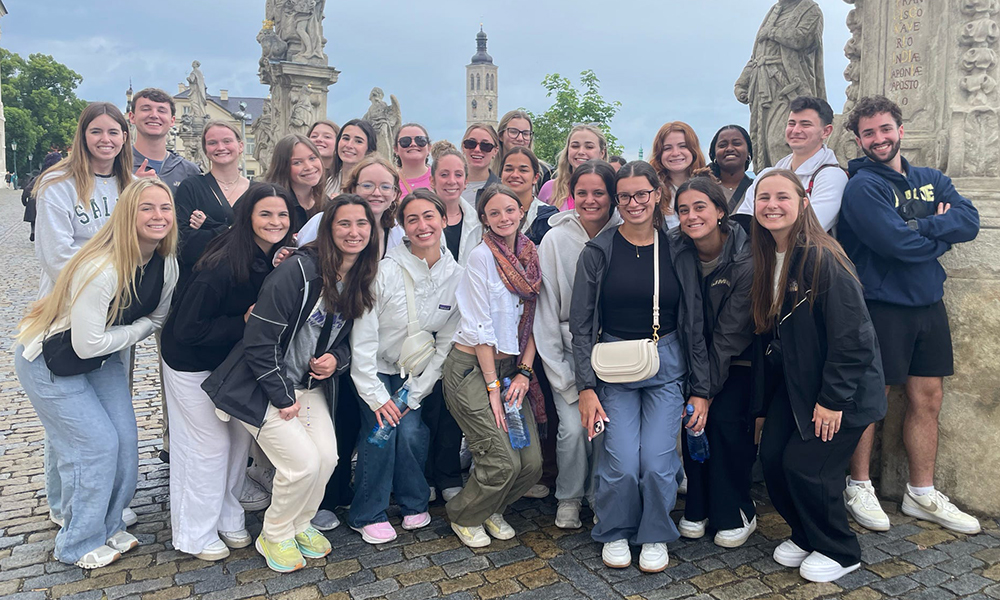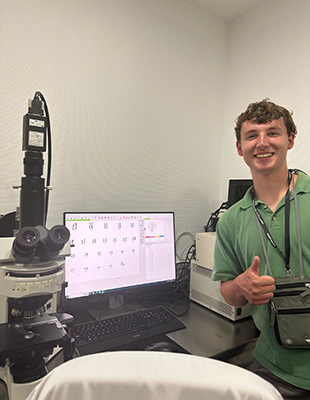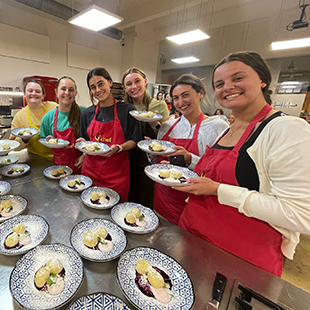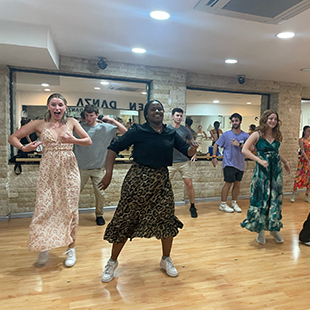European study abroad enriches perspectives on health care systems
College of Health and Behavioral Studies
Twenty-nine students from JMU traveled to Alicante, Spain, and Prague, Czech Republic, over the summer for the Global Healthcare Europe Study Abroad experience. Led by Jill Lassiter, assistant professor of Health Sciences, and Sharon Maiewski, associate professor of Health Professions, the group visited several medical facilities to observe how healthcare systems are implemented here and abroad over the two-week trip.
“We start with a history of health care,” Lassiter said. The group discusses “the history and structure of the healthcare system” they are visiting.
“After that, we go to facilities such as a public hospital, a private hospital, and a variety of other types of clinics,” said Lassiter.
 “At every place we visited, we did a tour of the facility, and then we met with the providers who work there for a Q&A,” said Lassiter. The group started the question session by asking the clinicians what they believed worked well or could improve in the health care system of the country, then they discussed specifics for that particular setting
“At every place we visited, we did a tour of the facility, and then we met with the providers who work there for a Q&A,” said Lassiter. The group started the question session by asking the clinicians what they believed worked well or could improve in the health care system of the country, then they discussed specifics for that particular setting
Before the group left for the trip, they participated in a similar discussion with local providers in the Harrisonburg area.
“When we’re abroad, we see really big differences between the private and public health care systems,” said Lassiter.
Senior Nursing major Anna Rehpelz, who attended the trip, enjoyed visiting the health care facilities. “Seeing public and private facilities was impactful in comparing them to America,” Rehpelz said.
Neeka Ganji, a senior Health Sciences major, noted something she learned through the trip was “not all health care services are free,” even in countries that provide universal health care. For example, Ganji learned that dental services are not included in government provided health care and operate as private practices in Spain.
Outside of clinical visits, the study abroad group also participated in several cultural experiences, including cooking classes, dance classes and outdoor adventures.
 “We had a cooking class where we made paella, which is a dish with rice and seafood,” Ganji said. “We did flamenco dancing, that was really fun. We also went to a lagoon where they had waterfalls that were really beautiful to see.”
“We had a cooking class where we made paella, which is a dish with rice and seafood,” Ganji said. “We did flamenco dancing, that was really fun. We also went to a lagoon where they had waterfalls that were really beautiful to see.”
“I loved the walking tours, seeing the infrastructure and old buildings like castles, churches and cathedrals,” Rehpelz said.
The cultural experiences also served to reinforce a practical understanding on how health care systems form and the impact of health care systems on individuals.
“You really can’t pull healthcare out of culture,” Lassiter said. “The way we think culturally dictates so much about the way that we interact with the health care system and the way it’s structured.”
While on cultural excursions, the students were encouraged to ask locals about their views on the health care system, similar to the discussions had with clinicians.
“[The locals] live here and go to the doctor here. Sometimes students learn as much [about health care systems] from their paddleboard instructor or cooking class instructor as they do from a health care provider, because they’re real people giving their honest opinions about what they think about health,” Lassiter said.
 One important takeaway for students Lassiter observed was that “they learned that universal health care means a lot of different things.”
One important takeaway for students Lassiter observed was that “they learned that universal health care means a lot of different things.”
“It is implemented very differently in different countries. That’s part of why we go to two different countries,” said Lassiter. “There are really great things about it, and there are really big challenges. They get a broader picture of health care systems that you just don’t get from reading a textbook.”
For a final project, students analyze case studies for patients with various conditions, including high-risk pregnancy or an athlete who tore their ACL, and consider what country’s health care system could provide the best care.
“They start to see that different systems are better at different things,” Lassiter said. She explains this exercise, and the trip overall, helps students understand that there is no “one size fits all” approach to health care or health care systems. “It’s really good for perspective,” she said.
A wide range of majors were represented within the study abroad group. “Some of the people that came on the trip, I would never have met at JMU,” Rehpelz said. “Hearing perspectives from other majors, like health sciences versus political sciences was cool to have in our conversations.”
“I hope that by seeing these different ways of thinking about health and wellness more generally, they bring that back to their own settings,” Lassiter said. “I hope they’re more open minded, slower to judge or assume, and more critical in the way they think about health care in general.”
